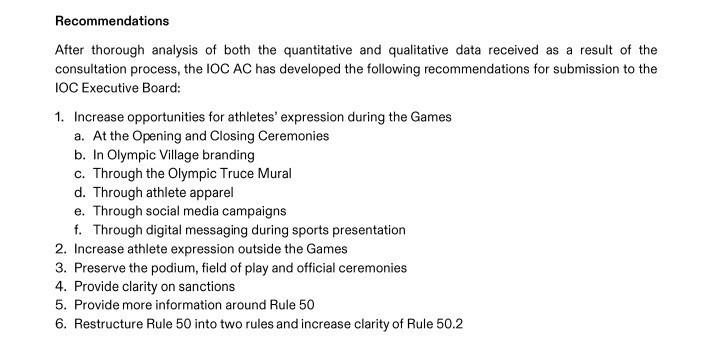The International Olympic Committee (IOC) Athletes' Commission has recommended maintaining the ban on podium protests at the Olympic Games, but called for a "restructuring" of Rule 50 and greater clarity on sanctions for breaches.
A report from the Commission - obtained by insidethegames - makes six recommendations following an 11-month consultation on Rule 50, which prohibits athletes from demonstrating or protesting in certain places at the Games.
They were all unanimously approved by the IOC Executive Board during its virtual meeting today.
The IOC had come under pressure to relax the rule in the wake of global anti-racism protests triggered by the death of George Floyd, an unarmed black man, at the hands of white police officer Derek Chauvin in the United States last May.
The IOC Athletes' Commission report suggests changes could be made in time for this year's postponed Tokyo 2020 Olympics, but the recommendations stop short of proposing the abolition of the rule that some countries have called for.
According to the findings of the survey held as part of the consultation, 70 per cent of the 3,547 respondents, who spanned 185 countries and all 41 Olympic sports, said the field of play and official ceremonies were not an appropriate place for competitors to demonstrate or protest.
Over two thirds - 67 per cent - held the same view when it came to the podium.
The majority of responses from Athlete Commissions who participated in a qualitative consultation with the IOC Athletes' Commission also signalled their opposition to athletes being allowed to protest on the podium, field of play or official ceremonies, the report said.
The IOC Athletes' Commission recommended to "preserve the podium, field of play and official ceremonies from any kind of protests or demonstrations, or any acts perceived as such".

The report from the IOC Athletes' Commission makes six main recommendations to the Executive Board ©ITG
The report notes how some athlete representatives used freedom of speech as the basis for their belief that they should be able to protest anywhere at the Games.
In the document, the IOC Athletes' Commission claimed it took this view into account but said freedom of speech "is not absolute" and "may be limited" under certain restrictions, which it said covers the Olympic Games, after consulting with human rights experts.
The report suggested the IOC "increase opportunities for athletes expression during the Games", including having a "moment of solidarity against discrimination" at the Opening Ceremony, which 48 per cent of survey respondents rated as "important".
Athletes could be allowed to wear kit and apparel featuring the words peace, respect, solidarity, inclusion and equality under the wider scope they are set to be given to express themselves at the Olympics.
Adapting the oath athletes recite at the Opening Ceremony to include messaging on inclusion and non-discrimination, increased opportunities outside of the Games, and increased social media campaigns were among the other recommendations.
The survey also sought opinions on physical gestures at Olympic venues, creating a specific area for demonstrations at the Olympic Village and wearing clothing or armbands with personal or collective messages.
The results showed "displaying a message on an armband/tattoo/badge/clothing that promotes the Olympic values" was the most appropriate option among those put forward.
While much of the findings were to be expected, the IOC Athletes' Commission did call for further clarity on the sanctions that could be handed down to athletes who protest in restricted areas at future Olympics.
The Commission itself devised Rule 50 guidelines in January of last year, which threated athletes with possible disciplinary action, and it is not clear whether they could be changed prior to Tokyo 2020.
"The IOC Athletes' Commission recommends that the Legal Affairs Commission clarify, in due course, the range of sanctions that would be imposed for a breach of the rule, taking into consideration the respective context of each individual case," the report states.
The United States Olympic and Paralympic Committee has said it will not punish athletes for demonstrations such as kneeling or raising a fist.
Several of the Athletes' Commissions who responded to the consultation called for clarification on what exactly defines a protest or a demonstration, an issue the report also acknowledged.
"Although the restriction imposed by Rule 50 may appear too sweeping, especially if compared to some sports organisations which allow expression in support of social (as opposed to political) causes, there are significant difficulties that an organisation as diverse and universal as the IOC would face in distinguishing between admissible and inadmissible causes," the report states.
"For this reason, a blanket policy of neutrality is deemed an appropriate and proportionate solution, including from a human rights perspective, given the risk of politicising the IOC and alienating countries or athletes.
"Rule 50 does not aim to silence athletes or make them apolitical...rather it is to keep the Olympic Games politically neutral."
The report also recommends the IOC separate the two different regulations which make up Rule 50.
Rule 50.2 states that "no kind of demonstration or political, religious or racial propaganda is permitted in any Olympic sites, venues or other areas", while 50.1 states: "Except as may be authorised by the IOC Executive Board on an exceptional basis, no form of advertising or other publicity shall be allowed in and above the stadia, venues and other competition areas which are considered as part of the Olympic sites.
"Commercial installations and advertising signs shall not be allowed in the stadia, venues or other sports grounds."
Several Athletes Commissions in the qualitative consultation admitted some of its members did not fully understand Rule 50.
"The combination of Rule 50.1 and 50.2 in Rule 50 leads to a lack of clarity on the scope and purpose of Rule 50," the report states.
The IOC Athletes' Commission wants "more clarity on the scope of 50.2, including by incorporating some elements that are currently included only in the Rule 50 guidelines, into the rule itself".
